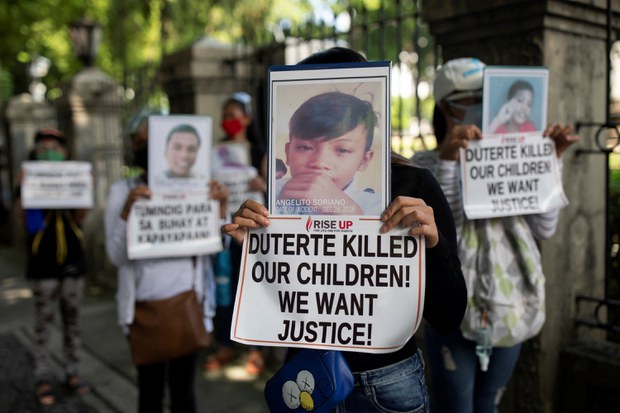Philippines rejects ICC decision to reopen drug war inquiry, says will appeal
2023.01.27
Davao, Philippines, and Manila
 Relatives of drug war victims hold photographs of their slain loved ones with placards calling for justice, during a protest to mark President Rodrigo Duterte's final year in office, in Manila, June 30, 2021.
Relatives of drug war victims hold photographs of their slain loved ones with placards calling for justice, during a protest to mark President Rodrigo Duterte's final year in office, in Manila, June 30, 2021.
The Philippines on Friday lambasted the International Criminal Court’s decision to re-open a probe into the country’s deadly drug war as a slight to its sovereignty, saying it would appeal the move.
The ICC on Thursday approved its prosecutor’s request to restart the investigation into the thousands of killings allegedly linked to ex-President Rodrigo Duterte’s war on drugs. In late 2021, when Duterte was still in office, The Hague-based court suspended its investigation saying it would assess a Philippines request for it to defer to Manila’s own investigation into the drug war.
The Philippine justice secretary slammed the ICC’s latest decision as “unreasonable,” while the solicitor general said the government would “exhaust all legal remedies” to appeal before the ICC’s appellate chamber against a resumption of the probe.
The Philippines and the Department of Justice “will not stand for any of these antics that tend to question our sovereignty and our status as a sovereign country,” Justice Secretary Jesus Crispin Remulla said at a news conference, according to the state-run Philippine News Agency.
“We are doing what it takes to fix the system. We have a functional judicial system and I don’t see where they can come in unless they want to take over our legal system and take over our country. I don’t see that happening,” Remulla added.
Solicitor General Menardo Guevarra, who was justice secretary in the Duterte administration, said the Philippines “can show that despite structural and resource limitations in our legal system, it is still a well-functioning system that yields positive results in its own time.”
About 8,000 suspected addicts and dealers died during the drug war under the Duterte administration (2016-22), according to official government numbers, but human rights groups have said the figure could be three times higher.
An internal investigation by the justice department in 2021 said that in many cases, police officers involved in the killings did not follow protocol and could be prosecuted.
ICC ‘not satisfied’
On Thursday, the ICC’s pre-trial chamber “granted the prosecutor’s request to resume investigation into the situation of the Republic of the Philippines,” the court said in a statement.
The ICC said it had examined all the submissions of the Philippine government, the prosecutor as well as the families of the victims.
It “concluded that the various domestic initiatives and proceedings, assessed collectively, do not amount to tangible, concrete and progressive investigative steps in a way that would sufficiently mirror the court’s investigation…,” the ICC said.
“Following a careful analysis of the materials provided by the Philippines, the Chamber is not satisfied that the Philippines is undertaking relevant investigations that would warrant a deferral of the Court’s investigations,” it added.
Duterte is facing two complaints at the ICC. One was filed by a former police officer and a self-styled assassin who accused Duterte of ordering the deaths of opponents and criminals when he was mayor of southern Davao city.
The second was filed by relatives of several people killed during the counter-narcotics campaign.
Like his predecessor Duterte, President Ferdinand Marcos Jr. also opposes an ICC probe.
Marcos has said the country could conduct its own investigation and has also rejected calls from human rights groups for the Philippines to rejoin the ICC, after Duterte pulled the country out in 2019.
While in office, Duterte repeatedly insisted that the ICC no longer had jurisdiction over the Southeast Asian nation because Manila had officially cut ties with the international court.
‘ICC offers a path forward’
Human rights groups and activists meanwhile welcomed the ICC’s decision to resume the investigation.
Phil Robertson, deputy Asia director at Human Rights Watch, said the ICC probe was the only credible avenue for justice for the victims and their families.
“As the court’s judges agreed, Philippine authorities are not ‘undertaking relevant investigations’ into these crimes,” Robertson said.
“The ICC offers a path forward to fill the accountability vacuum.”
In Manila, opposition Sen. Risa Hontiveros welcomed with renewed hope the ICC’s decision to press on with the probe.
“I hope the president adheres to international law and the Rome Statute as part of our commitment to the community of nations against state sponsored impunity,” she stressed, referring to President Marcos.
“There is overwhelming evidence that the war on drugs carried out widespread and systematic violations of human rights. Let justice be done,” she added.
Human rights lawyer Neri Colmenares urged Marcos to tread a different path from his predecessor and “instead respect human rights and due process.”
“He shouldn’t be blindly obedient to Duterte. Such a move will not only be for the interest of justice but would also show the international community that the Philippines does not tolerate human rights abuses and impunity,” the lawyer, who belongs to the Bayan Muna political party, told BenarNews.
“This is a positive development as victims of the fake drug war of the Duterte administration can still get justice even outside Philippine courts.”
Richelle V. Umel in Iligan city, southern Philippines, contributed to this report.







